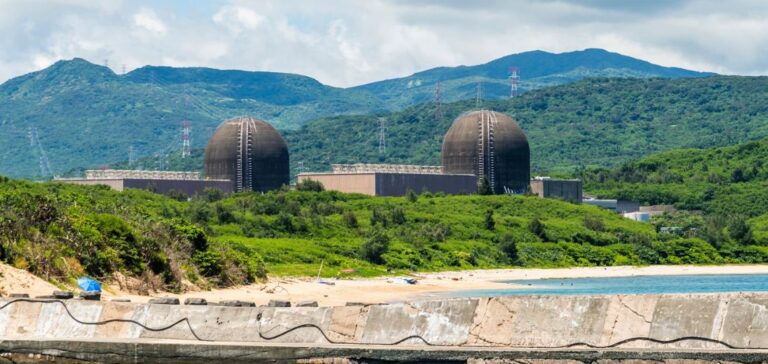Taiwan is facing difficulties to ensure its energy security, the country wanted to turn to renewable energy.
Energy constraints
Taiwan must deal with its dependence on energy imports in a complicated geopolitical context. Nuclear power, which already exists, but is a contentious issue for historical and political reasons, could be a solution for the country. It is unlikely that a large-scale nuclear project will emerge on the island in the near future.
However, the existing plants have a strong potential for extension. SMRs could be a future solution to contribute to Taiwan’s energy security. Faced with the energy shortage that Taiwan is facing, the government could ask for the restart of nuclear reactors.
Taiwan is a dynamic and powerful economy. Its growth in 2021 reached 6% and the country ranks in the top 20 worldwide in terms of GDP. Taiwan is an export-oriented manufacturing economy, especially in the semiconductor industry. Manufacturing industries, which account for 30% of Taiwan’s GDP, consume a large portion of the country’s available energy.
According to the Bureau of Energy, industrial production accounted for 56% of Taiwan’s total electricity consumption. Electronics manufacturing alone accounted for 37%. However, Taiwan is facing energy constraints that could hinder its industrial success.
First of all, the size of the country constrains Taiwan in its energy development possibilities. Indeed, as researchers Sih Ting Jhou and Huei-Chu Liao pointed out in 2013:
“Taiwan has a near-zero energy endowment and relies on imports for nearly 98% of its consumption.”
The country remains dependent on gas imports on a just-in-time basis.
A contrasting situation
Its reserves are not superior to two weeks. Thus, a potential Chinese blockade could jeopardize the island’s energy supply. While Taiwan’s president wants to move away from nuclear power, the country uses mostly fossil fuels to produce its electricity.
Indeed, coal provides 45% of the electricity. Natural gas provides 37%. Nuclear and renewable energies complete the picture with 10% and 6% of electricity production respectively.
Tsai Ing-Wen, the President of Taiwan, proposed in 2017 to increase the share of natural gas to 50% of the electricity mix by 2025. It also wanted to accelerate the development of renewable energies. The goal was to reach 20GW of solar installations, and 5GW of offshore wind.
Despite the development of many renewable projects, such as the Lightsource BP solar project in Taiwan, the island is facing power outages. This would happen in May 2021 as well as March 2022, undermining productivity in the process. Moreover, its dependence on natural gas, which arrives in Taiwan in the form of LNG, could prove problematic in the event of a Chinese blockade.
Given its electricity needs and the constraints the island faces, nuclear power is a credible candidate for Taiwan. Tsai Ing-Wen’s plan calls for all three plants to be decommissioned by 2025. The construction of a fourth plant, Lungmen, is currently awaiting a decision.
An operational potential
Taiwan’s nuclear power plants date back to the authoritarian regime of Chiang Kai-Shek. The objective was to ensure the country’s growth by protecting itself against the risks associated with oil crises. Moreover, Chiang Kai-shek’s authoritarianism is now associated with nuclear power plants by some activists.
The country is politically divided between the supporters of nuclear power who support the Kuomintang, the party of Chiang Kai-Shek. The other party consists of the supporters of the current president, the DPP, who is largely opposed to nuclear power. This political opposition splits opinions on nuclear power, and undermines the extension of existing plants.
Taiwan now has three operational nuclear power plants. The first one is located in Jinshan. The second is Kuosheng, and the third is in Maanshan. They each have two boiling water reactors with respective capacities of 1208MW, 1970MW and 1102MW.
Currently, both Jinshan units are out of service. This is also the case for one of the reactors at the Kuosheng power plant. The life extension potential of all Taiwanese reactors is excellent, including those already shut down.
This is due to the political situation in the country which prevents their dismantling. Indeed, as Taiwan does not have a storage site, none of the three reactors is completely shut down. This serves to preserve the safety of spent fuel.
RMS, a new perspective
A fourth plant is being completed, but is not operational. It would represent an installed capacity of 2700MW. The government organized a referendum in 2021 on the commissioning of this reactor, the result was negative.
Taiwan could, by reactivating its reactors and completing the last plant, have 7.78GW of nuclear power. Thus, this would represent about 20% of the 2022 peak demand. It is unlikely that a new large-scale nuclear program will emerge in Taiwan in the coming years.
However, business leaders are increasingly focusing on small modular reactors (SMRs) to develop nuclear on the island. The major Taiwanese manufacturers are indeed looking to secure their own energy sources. They want to avoid power outages as well as political pressure.
In addition, SMRs represent an opportunity to appeal to Taiwan’s nuclear-averse population. These technologies are safe because of their passive safety features. In addition, the Ministry of Economic Affairs states that it did not want to exclude SMR and fusion from future energy opportunities.
Nuclear energy appears to be essential if Taiwan is to reduce its dependence on gas. It will also allow it to reduce the pressure that China could put on its energy security. SMRs would meet this need for nuclear power, while avoiding political disagreements.






















